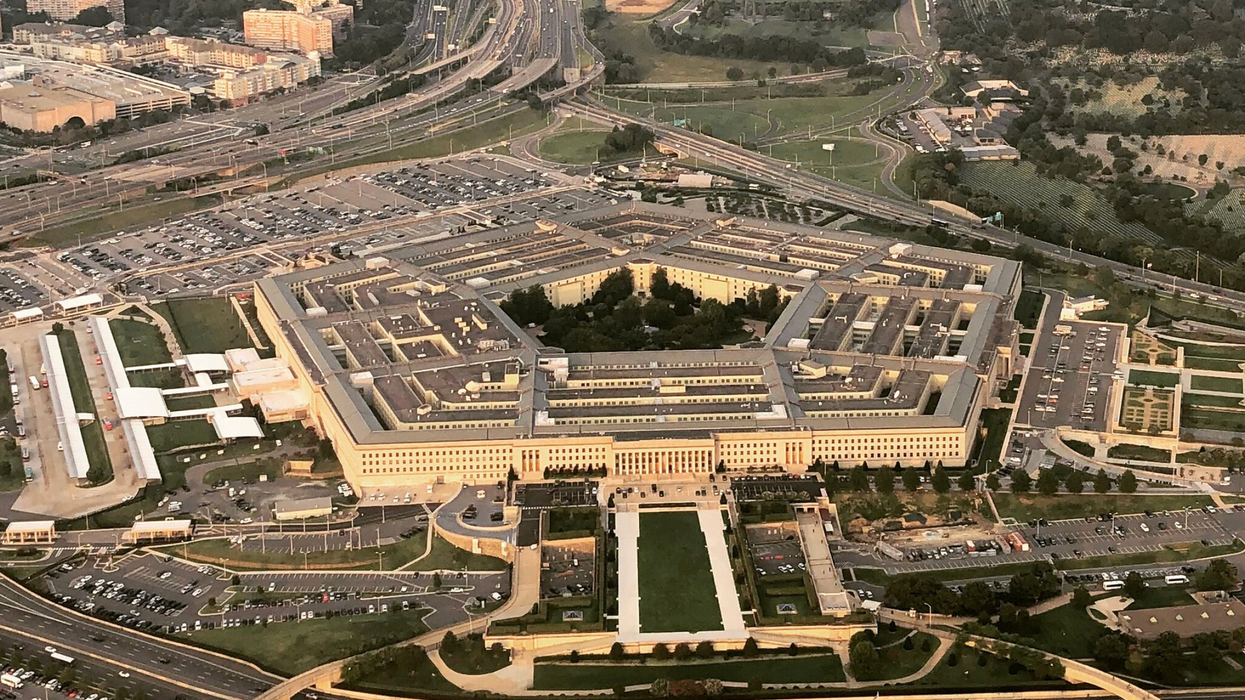Their diagnosis offers a map of the structural forces that continuously push America toward war, even when the public wants peace and even when national security (and economics) is the pretext rather than the driver. America engineers itself into these wars for elite interests.
As Hartung and Freeman detail, more than half of the Pentagon budget now goes to private contractors. These corporations, especially the “Big Five” of Lockheed Martin, RTX (formerly Raytheon), Boeing, General Dynamics, and Northrop Grumman, have together absorbed more than $2.1 trillion in Pentagon contracts in the post-9/11 era. The book opens by reminding us that $8 trillion were wasted by the war machine on the wars in Iraq and Afghanistan.
The end of the world and MAD could be ushered in because Lockheed Martin and Congress can’t stop obsessing over their stocks and profits.
That sum alone could have fully decarbonized the US electrical grid; paid off every student loan in the country; and still had trillions left for climate resilience, healthcare, and democratic infrastructure. Even just maintaining the system as it is costs billions—America’s 750 military bases in 80 countries cost $55 billion a year to maintain. A lot of them, like in Guam, have also destroyed the environment, caused irreparable health effects, and stalled the local economy and democracy.
When Jamal Khashoggi was murdered, and Congress briefly considered blocking US weapons transfers to Saudi Arabia, lobbyists went to work behind the scenes to “derail the initiative.” In the same week they lobbied lawmakers, they donated to the same lawmakers’ campaigns. Everything about that should look like bribery. But because the military-industrial complex is woven into the legal, regulatory, and cultural DNA of Washington, it is perfectly legal. In fact, it’s just a regular Tuesday. This is the machinery that powers nearly every war the United States engages in.
Hartung and Freeman document how 945 lobbyists work directly for Pentagon contractors; how dozens of them are simultaneously registered as foreign agents; and how former members of Congress, Pentagon staffers, and even chiefs of staff for the nation’s most powerful leaders pass seamlessly through the revolving door to sell weapons to Egypt, Saudi Arabia, Qatar, and other authoritarian regimes. American foreign policy is shaped in lobbying offices, overpriced dinners, and backdoor negotiations with firms that openly expect “business benefits” from new wars. The consequences of this model are catastrophic for human life.
The book recounts how US weapons have fueled atrocities in Yemen, the Philippines, Nigeria, Egypt, and now Gaza, where the authors confirm what most of us progressives already knew; that most of the people killed “have nothing to do with Hamas.” They cite updated reporting that the Biden administration concluded more than 100 separate arms transfers to Israel in the first months of the war, without even informing Congress.
More than half of the conflicts on Earth involve US weapons on at least one side. The United States continues to arm regimes that Freedom House classifies as “not free,” even when those regimes commit torture, disappearances, mass detentions, and extrajudicial murders. Even this week, there has been reporting into Egypt’s continued use of torture and crimes against humanity in its “counterterrorism” efforts, with US weapons and taxpayer money. Wherever there is repression, inequality, or mass death, US weapons are often close by. The results do not make the US, or the world, safer, freer, or more prosperous; in fact, they do quite the opposite.
Hartung and Freeman trace how an arms industry that began as an adjunct to US defense has transformed into a permanent, profit-seeking entity that requires conflict to justify its existence. They revisit the “last supper” of the 1990s, when defense mergers consolidated the industry into a small cluster of giants, and the Pentagon volunteered billions in taxpayer dollars to subsidize those mergers, even giving executives multimillion-dollar “golden parachutes,” funded by tax money.
They revisit how the highly dangerous nuclear triad was shaped not by strategy but by “turf wars” between the Air Force and Navy, each desperate to preserve its slice of the budget. That’s right, the end of the world and MAD could be ushered in because Lockheed Martin and Congress can’t stop obsessing over their stocks and profits. Hartung and Freeman also revisit the disastrous Littoral Combat Ship program, the “Little Crappy Ship,” which was pushed through political pressure even after the Navy warned it was unfit for combat. M1 Abrams tanks were also sold to Ukraine, after being pushed by think tanks funded by defense contractors, even as the tanks resulted in catastrophic casualties for Ukrainian fighters. In every case, the logic is identical. Weapons are built because there is profit in building them, not because there is security in possessing them. Don’t fall for the tired arguments about “job creation” and “American manufacturing,” either; Hartung and Freeman show other, non-military economic sectors are much better at creating jobs, for cheaper. Most MIC jobs aren’t even unionized.
One of the book’s most disturbing contributions is its detailed exploration of how the war machine’s surplus equipment, tactics, and political culture flowed into policing. The authors describe a country where protesting can be met with military-grade rifles, armored vehicles, acoustic weapons, and tear gas developed for counterinsurgency. They note that more than 6,500 police departments have received $7 billion worth of Pentagon equipment through the 1033 Program. They argue that “it’s not the police, it’s a paramilitary force.” It’s simply the domestic mirror of the foreign policy problem (also called the Imperial Boomerang). Now, American communities live under the terror and oppression that much of the world has suffered through, in Washington’s own wars.
The authors argue for a “new peace network,” a coalition of movements that understand militarism as a unifying force behind poverty, racial injustice, surveillance, climate destruction, and authoritarianism.
The authors also underline the economic argument for dismantling the war machine. Military spending has become one of the least efficient job creators in the entire US economy. Investments in healthcare, education, climate resilience, and clean energy create far more jobs than investments in defense. Pentagon contractors, they show, are shedding union jobs at historic rates. Corporations like Lockheed Martin spend billions on stock buybacks rather than innovation. Automation will soon cut even more jobs. The economic bargain that once tied militarism to employment is dissolving. The authors argue that a just transition away from militarism is not just possible. It is necessary.
The authors also expose how deeply media culture is implicated in sustaining this system. Hartung and Freeman recount how Hollywood rewrites scripts at the Pentagon’s request in exchange for access to hardware. How think tanks funded by weapons manufacturers produce reports that conveniently recommend more weapons purchases. How television networks turn war planners into celebrities, how the Iraq War was sold through manufactured narratives, and how even major news organizations were swept up in the 9/11 wave of militarism. They highlight the “artificial consensus” that emerges when the same small circle of MIC-funded think tanks supply the experts for congressional hearings, television panels, and academic publications. This is why dissent is always framed as fringe, because it goes against an entire manufactured apparatus of propaganda and warfare, funded by taxpayer money and corporations.
The book is chock-full of these stories, each more infuriating than the other, but compiled in a way that could drive someone numb. However, do not despair; the authors, as they should, propose a successful path forward.
Every chapter offers a form of resistance, however small. They emphasize the importance of organizations like the Project on Government Oversight (or POGO), which, though it started out mostly getting attention from conspiracists and sci-fi enthusiasts, has defended whistleblowers and exposed fraud. They highlight reporting from independent outlets like ProPublica and FAIR that refuse to act as stenographers for the war machine, and progressive fighters in Congress like Sen. Elizabeth Warren (D-Mass.), Sen. Bernie Sanders (I-Vt.), and Rep. Ro Khanna (D-Calif.), who have pushed back from the inside.
They recount moments when insiders resisted corruption, when whistleblowers forced accountability, and when activists successfully shut down harmful programs. Public opinion overwhelmingly opposes new nuclear weapons, endless wars, and blank-check aid to repressive allies. The machine can be broken, but it takes an “all-hands-on-deck approach,” as the authors hammer home.
The book’s most hopeful chapter focuses on the much-needed peace movement. The authors argue for a “new peace network,” a coalition of movements that understand militarism as a unifying force behind poverty, racial injustice, surveillance, climate destruction, and authoritarianism. They highlight the Poor People’s Campaign, built on Dr. Martin Luther King Jr.’s vision, which brings veterans, workers, and marginalized communities into a shared struggle against economic exploitation and war. They emphasize that any new peace movement must bridge ideological divides, drawing support from libertarians, populists, progressives, veterans, and communities directly harmed by war and militarization. They warn against grifters and extremists who exploit anti-war sentiment to push bigotry or authoritarian agendas (one could maybe think of examples, like Tucker Carlson, Matt Walsh, Nick Fuentes, or even Donald Trump). They insist that a principled peace movement must be rooted in solidarity, democracy, and human dignity.
This is where Hartung and Freeman’s credibility matters. Both authors have spent years inside Washington, fighting the very system they describe. Freeman’s landmark investigations at the Project on Government Oversight reshaped our understanding of foreign influence, and his current work at the Quincy Institute, including with the Think Tank Funding Tracker, continues to expose the financial pipelines between authoritarian regimes and corporations, and US policymaking.
Their blueprint also includes campaign finance reform to sever the link between money and militarism. It includes transparency laws to expose think-tank conflicts of interest, robust whistleblower protections for insiders willing to confront corruption, new priorities for federal spending that center human needs rather than endless war, and, most importantly, reimagining foreign policy around genuine defense rather than global weapons distribution. They, for instance, point to arming Ukraine against Russia’s imperialistic invasion as a noble cause (with caveats of course, which they get into), but warn against arming Israel, whose wars in the Middle East are not defensive. But this can’t happen without people pushing relentlessly.
The book ends with a warning and a call to action. The war machine is everywhere. It exists in budgets; in lobby shops; in universities; in movies; in police departments; in political campaigns; at sports games; and in the language we use to talk about our politics, society, culture, and life. But monsters can be tamed. They can be disrupted, defunded, delegitimized, and replaced.
We must get informed (first by reading this book!), pressure our representatives, support whistleblowers, follow and strengthen genuine independent media, create and join movements fighting militarism, and refuse to accept that endless war is the price of life, freedom, and citizenship. We all have agency, power, and responsibility to stop the war machine. Time to organize.


